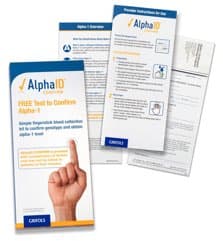The facts about alpha-1 and testing
Based on your 23andMe genetic report, it is natural to have questions. Below are some facts that can help start to answer your questions before you meet with your healthcare professional.
How is the AlphaID CONFIRM test performed?
The AlphaID CONFIRM test is a free, quick, and easy fingerstick that takes less than 10 minutes to conduct in your healthcare professional's office. Your healthcare professional mails your blood sample to an independent national lab for testing. The results are kept in the strictest confidence by the independent lab. Results are shared only with your healthcare professional.

All the items your healthcare professional needs to perform the simple fingerstick will be included in the AlphaID CONFIRM test that you receive by mail.
Since I already know I'm at risk for alpha-1, why should I get tested?
Your 23andMe genetic report is not a diagnosis of alpha-1. The only way to diagnose it is with a simple blood test. The AlphaID CONFIRM test is free and allows your healthcare professional to confirm your 23andMe results, identify the level of alpha1-antitrypsin (AAT) in your plasma, and establish your baseline level. This can help you and your healthcare professional make decisions and address changes in your health in the future.
What is alpha-1?
Alpha1-antitrypsin deficiency (AL-fa / one / an-tee-TRIP-sin / de-FISH-an-see), often called alpha-1, is a rare genetic condition that can lead to serious lung and liver disease. Alpha-1 is passed down from your parents through your genes.1
What causes alpha-1?
As you learned from your 23andMe genetic report, alpha-1 is caused by genetic variants (differences) in the SERPINA 1 gene. This gene contains instructions for making the AAT protein. AAT is made in the liver and it helps protect lungs from damage. Certain genetic variants in SERPINA 1 result in too little AAT getting to the lungs and too much AAT getting trapped in the liver. As a result, lung and liver damage may occur.2,3
How serious and common is alpha-1?
Alpha1-antitrypsin deficiency can lead to serious lung and liver disease. Approximately 100,000 people in the United States have alpha-1, but fewer than 10% of them have been diagnosed. This is why it is important to get tested by your healthcare professional and start the conversation.4
People with alpha-1 may develop COPD (a serious lung disease) or liver cirrhosis (scarring of the liver).3,5
- Lung-related symptoms may include shortness of breath, wheezing, chronic cough, and recurring lung infections
- Liver-related symptoms may include jaundice (yellowing of the skin)
How is alpha-1 treated?
If your healthcare professional diagnoses you with alpha-1, treatments may be available to increase the amount of the alpha-1 protein in your blood. In addition, since alpha-1 is genetic, you can discuss family testing.
The only way to know if you have alpha-1 is to get tested.
Where else can I go for information?
Alpha-1 Foundation
Toll-free: (877) 228-7321
www.alpha1.org
The Alpha-1 Foundation is the only national organization dedicated to developing a cure for alpha-1 and to improving the quality of life for patients and their families. Acting as a patient advocate, the foundation helps the alpha-1 community better connect to one another—strengthening the support and care networks they need.
To find an Alpha-1 Foundation Clinical Resource Centers (CRCs) who specializes in patient care, education and research for alpha-1, call (877) 228-7321 Ext: 321 or Click Here.
The Alpha-1 Foundation also offers a comprehensive brochure about alpha-1. Download it now
AlphaNet
Toll Free: (800) 577-2638
www.alphanet.org
AlphaNet is a not-for-profit health management company providing comprehensive services exclusively to the alpha-1 community via care coordinators who are patients themselves.
References:
- What is alpha-1? Alpha-1 Foundation website. https://www.alpha1.org/what-is-alpha1. Accessed July 18, 2019.
- What causes alpha-1 antitrypsin deficiency? National Heart, Lung, and Blood Institute website. https://www.nhlbi.nih.gov/health/health-topics/topics/aat/causes. Updated October 11, 2011. Accessed July 18, 2019.
- Let's talk about alpha-1 antitrypsin deficiency. 23andMe website. https://www.23andme.com/topics/health-predispositions/alpha-1-antitrypsin-deficiency. Accessed July 11, 2019.
- Campos MA, Wanner A, Zhang G, Sandhaus RA. Trends in the diagnosis of symptomatic patients with α1-antitrypsin deficiency between 1968 and 2003. Chest. 2005;128(3):1179-1186.
- What is COPD? COPD Foundation website. https://www.COPDfoundation.org/What-is-COPD/Understanding-COPD/What-is-COPD.aspx. Accessed July 18, 2019.
23andMe is a trademark or registered trademark of 23andMe, Inc.


